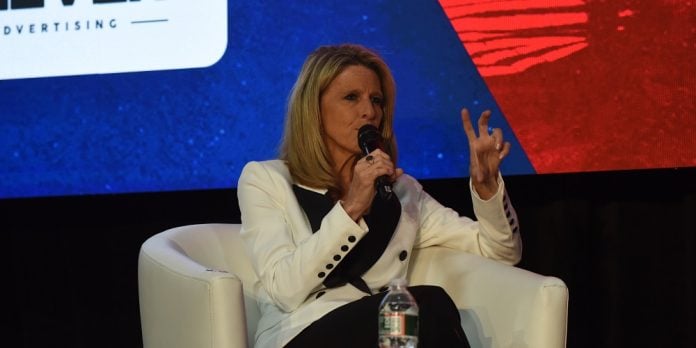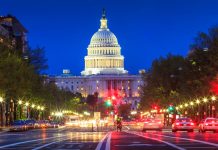FanDuel CEO Amy Howe wants to see more diversity in sports betting, as she believes the industry can do more to encourage more women to wager on sports.
During her one-on-one keynote chat with CNBC Correspondent Contessa Brewer at SBC Summit North America, Howe spoke about a variety of different topics, including women in sports betting and igaming, and her vision for the future of FanDuel and the industry as a whole.
Encouraging women to wager on sports
On the Sports Betting Leaders track, sponsored by Sportradar, the FanDuel CEO was asked by Brewer how can the industry encourage more women to wager on sports and her hiring strategy to promote more women participation. She responded by noting that while sports fans are now roughly 50% women, only 15% to 20% wager on sports.
To utilize this “untapped opportunity” and encourage more women to participate in sports betting, she added the industry needs to make its products more consumable to that audience.
Howe said: “I think it’s important for us to start to make our product consumable to that audience, and there’s a lot of things that we’re trying to do. By no means have we cracked the code on this, but I think supporting female athletes and advocating for equity with female athletes is really important.
“But you’re right, in terms of who I hire, making sure that we’re a reflection, not just from a gender perspective, but just diversity of all types of the population is important to make sure that we can go after those opportunities.
“There’s still a lot of experimentation that we’re doing to really crack the code, but the numbers are compelling, Last year, women on sports betting platforms were growing at 115% times the rate of men, so we’re making progress, but there’s a lot of untapped opportunities that we haven’t, as an industry, yet gone after.”
When asked by Brewer if any certain sports are drawing more women to wager than others, Howe replied that the NFL and NBA are still just as big draws as they are for men, but there are a couple of differences.
“Yeah, I mean, not surprisingly, the biggest sports, which are NFL and NBA, are still the sports that are drawing women in. I think what we’re seeing is that there are a couple of differences.
“One is sometimes you need to do a little bit of an orientation for women as there can be an intimidation factor. By the way, many men in my organization would admit this, they would just admit it quietly. So I think just orienting them to the category and the product is one thing.
“Also, for women, in particular, even more so than men, there’s a social or community aspect to it and so we’re really trying to tap into that and figure out how to create offerings and promotions and ways to bring women together so that they can actually tap into that community aspect.”
Sports betting and igaming crossover
For igaming, it’s much closer to a 50/50 male-female split, as Howe stated the big casinos have been going after the female audience for “quite some time”.
In terms of crossover between sports betting and igaming, the FanDuel CEO noted it has been successful in states where both have been regulated such as Connecticut.
When asked by Brewer why some states are just legalizing sports betting and not following the path of New Jersey and regulating igaming as well, Howe mentioned that sports wagering had a lot more momentum behind it following the repeal of PASPA in 2018.
“I think the regulatory cycle that we have seen is about what we would have expected in the sense that, when PASPA was repealed back in 2018, initially all the momentum was around legalizing sports betting.
“If you go all the way back in the history books, obviously this predates me, DraftKings and FanDuel as the two dominant fantasy sports players in the US, were able to leverage a lot of the regulatory environment. The lobbyists that we had, Christian Genetski, who is our Chief Legal Officer who was really driven a lot of that for the industry, helped create a lot of that momentum the minute PASPA was repealed.
“I think we always expected that sports betting was going to gain much quicker momentum. What I’d say is in the five states where igaming has been legalized, those states are very happy. The economic surplus that igaming generates, in addition to sports betting, is massive if you look in New Jersey, Pennsylvania, Michigan, and West Virginia. We’re very pleased with those early results, I think it’s just going to take a little bit longer to create that momentum.”
California – cautiously optimistic
On the topic of legalization and permitting gaming, Howe was asked by Brewer about her thoughts on the state of California and what’s at stake on the ballot initiative in November, to which she said she was “cautiously optimistic” that the referendum would pass.
“Well, as a resident of California, I’m very cautiously optimistic that this referendum is going to pass. The way this has been set up and architected, I think there’s a win-win on many levels. Despite what you might see on TV, the reality of this is that the Californian solutions for homelessness and mental health will generate more revenue than any other initiative ever has, for homelessness, in particular, but for both causes.
“The first thing that we can feel very good about is that 85% of the tax revenue will go to those two causes. The remaining 15% will go to many tribal constituents in the state of California to the tune of 160, and even some of those small tribal nations that may not directly compete in sports betting are still going to benefit, so that remaining 15% goes to those tribes as well.
“The important thing to not lose sight of is that sports betting is happening in California, whether it’s legalized or not, it’s just happening in the illegal or the unregulated market.
“If you look at the research that the American Gaming Association and others have done, over 90% of consumers want sports betting to be legalized, and they should because it protects our consumers at the end of the day. It creates great revenue for the state and the constituencies that should be getting that money, as opposed to the illegal operators who are benefiting from not having to pay those tax dollars.”















